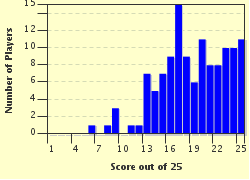Quiz Answer Key and Fun Facts
1. The letter 'A' is for 'Aaron', the brother and right-hand man of Moses. How is Aaron described in Psalm 106:16 in the KJV and NKJV? (The NIV uses different wording.)
2. The letter 'B' is for 'Born' and 'Basket'. According to Scripture, shortly after Moses was born, he was placed in a basket on the Nile River and he ended up being adopted by an Egyptian woman. Who was his adoptive mother? (Exodus 2:9)
3. The letter 'C'. Out of the four names below that start with the letter 'C', which person was one of twelve spies sent by Moses to survey the land of Canaan; only he and Joshua had favorable reports? (Numbers 13:30)
4. The letter 'D' is for 'Death'. According to Deuteronomy 34:1-11, where did the death of Moses take place?
5. The letter 'E' is for Ethiopia. Numbers 12:1 in the KJV and NKJV tells of Moses marrying an Ethiopian woman, supposedly after the death of his first wife Zipporah. What was the Ethiopian woman's name? (The NIV uses the word Cushite, rather than Ethiopian.)
6. The letter 'F' is for 'Fled' and Freedom'. How many years did the Israelites spend in the wilderness when they fled Egypt to enjoy the freedom of the Promised Land? (Exodus 16:35)
7. The letter 'G' is for 'Gold Calf'. When Moses came back down from Mount Sinai after meeting with God, he was infuriated to see the children of Israel dancing around a gold calf. What did Moses order as punishment for the people? (Exodus 32:20)
8. The letter 'H' is for 'Hail'. The book of Exodus tells of the LORD hitting Egypt with ten plagues to soften the Pharaoh's heart to allow the Israelites to stage an exodus out of the land. The seventh plague, according to Scripture, involved a highly-punishing hailstorm that lashed Egypt. According to Exodus 9:23 in the KJV and the NKJV, the hail storm was accompanied by fire.
9. The letter 'I' is for 'Intercessory'. Numbers 14:1-38 tells of Moses serving as an intercessory for the Israelites as they had provoked the LORD to such wrath He talked about striking them with a pestilence and disinheriting them. What action of the Israelites generated such wrath?
10. The letter 'J'. A person whose name starts with the letter 'J' replaced Moses as leader and led the Israelites into the Promised Land. Can you name him?
11. The letter 'K'. Out of the four names below that start with the letter 'K', which man, along with Dothan and Abioram, led a revolt against Moses? According to the 16th chapter of Numbers he was killed along with all his associates when the earth opened up and swallowed them.
12. The letter 'L' is for 'Leprosy'. Which one was struck with leprosy because of grumbling, and then healed by the LORD? Numbers 12:1-5
13. The letter 'M' is for 'Murder'. According to Exodus 2:11-12, Moses murdered an Egyptian beating a Hebrew worker and hid the body in the sand. When Moses found out there was a witness to the murder and the Pharaoh wanted him dead, he fled to a foreign land. Where did Moses flee to, as per Exodus 2:15?
14. The letter 'N' is for 'New Testament'. According to Matthew 17:1-13, what event in the New Testament did Moses make an appearance at?
15. The letter 'O' is for 'Outside' as in 'Outside Looking In'. According to Numbers 20:12, why were Moses and Aaron not allowed to enter Canaan, aka the Promised Land?
16. The letter 'P' is for 'Plagues'. Out of the ten plagues unleashed by God on Egypt, which one was last?
17. The letter 'Q' is for 'Quail'. Scripture tells of the Israelites being given quail and manna to eat while on their exodus out of Egypt. According to Numbers 11, while the Israelites were eating quail they were complaining, once again, and the LORD stuck them with a "very great plague."
18. The letter 'R'. What was the name of the body of water that God enabled Moses to part, allowing the Israelites to leave Egypt? (Exodus 14)
19. The letter 'S'. Exodus 7:9-10 tells of God giving instructions to Moses and Aaron to perform a miracle when they initially met with the Pharaoh to request permission for the Israelites to leave Egypt. The verses say God told Aaron to cast his rod and it would become something else. What did the rod become when Aaron cast it before the Pharaoh?
20. The letter 'T' is for 'Ten' as in the 'Ten Commandments'. What is the first commandment? (Exodus 20:1-17 and Deuteronomy 5:4-21)
21. The letter 'U'. Out of the four words below that start with the letter 'U', what one best describes the children of Israel during their lengthy Exodus out of Egypt to the Promised Land?
22. The letter 'V' is for 'Victory' as in 'Victory Song'. In Exodus 4:10, Moses describes himself as "not eloquent" as well as "slow of speech and slow of tongue." However, these so-called drawbacks didn't prevent Moses from leading the Israelites in singing a victory song when the Egyptian army was drowned in the Red Sea. (Exodus 15:1-18)
23. The letter 'W' is for 'Water'. According to the 17th chapter of Exodus, the Israelites were experiencing severe thirst in the wilderness of Sin. What miracle did the LORD enable Moses to perform to alleviate the thirst of the people?
24. The letters 'X' and 'Y' is for 'Younger'. Moses' brother, and often right-hand man, was Aaron. According to Scripture, who was the younger? Was it Moses, or was it Aaron? (Exodus 7:7)
25. The letter 'Z'. Who was the daughter of Jethro, and Moses' wife?
Source: Author
Cowrofl
This quiz was reviewed by FunTrivia editor
agony before going online.
Any errors found in FunTrivia content are routinely corrected through our feedback system.

